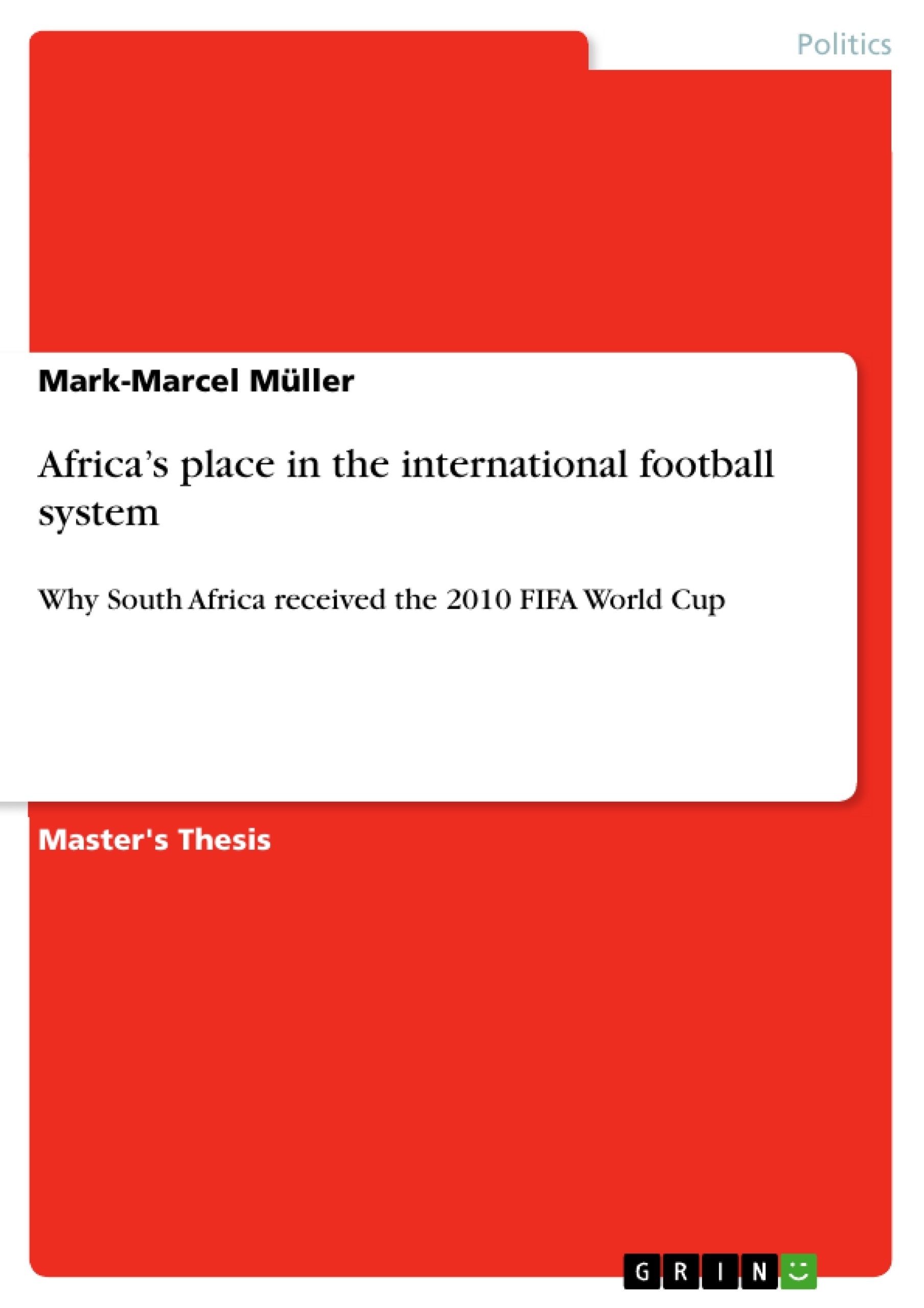For millions of people around the globe, football is an important part of everyday life. Similarly, many African governments have found in international football competitions one of the few opportunities to be internationally represented. Furthermore, through successful participation of their respective national football sides, they internally seek to foster nationhood. In fact, football is an integral part of African self-esteem with regards to being recognised by the rest of the world. However, to succeed in international sports means to succeed in a politico-economic structure far from equality and general solidarity. This thesis goes about the question why South Africa received the FIFA 2010 World Cup. Thereby it will distinguish the position of the African continent within the international football system.
A historical analysis will clarify the processes and actors as well as the driving motivations which led to the FIFA World Cup host decision in favour of the African continent. The outcome of this study suggests that social interaction is driven by the interplay of two variables: normative principles and economic practices. The historical development of modern social behaviour from the 16th century until today’s global capitalism surely reflects the interplay of these two traits.
At the hand of the historical development of the international football system this thesis is going to outline this interplay – as a European form of behaviour that came to encapsulate all social relations on the globe particularly by the spread of the cultural practice of football. This study reaches the overall conclusion that the decision to let an African nation host the FIFA World Cup meant that economic practice and normative principles were brought into perceived congruence.
Inhaltsverzeichnis (Table of Contents)
- Abstract
- Opsomming
- Introduction
- The International Football System
- The Development of the International Football System: From a European to a Global Game
- South Africa as FIFA World Cup Host – A Case Study for Africa's Place in the International Football System
- Economic and Normative Aspects of the FIFA World Cup Decision
- Conclusion
Zielsetzung und Themenschwerpunkte (Objectives and Key Themes)
This thesis aims to explore why South Africa was awarded the hosting rights for the 2010 FIFA World Cup. The study will examine the position of the African continent within the international football system and analyze the factors that led to Africa's successful bid. It will also explore the interplay of economic and normative principles in shaping the decision-making process within FIFA.
- Africa's position in the international football system
- The historical development of the international football system
- The significance of hosting a FIFA World Cup for Africa
- The interplay of economic and normative factors in FIFA's decision-making process
- South Africa's success in securing the 2010 World Cup hosting rights
Zusammenfassung der Kapitel (Chapter Summaries)
The thesis will delve into the historical development of the international football system, highlighting its origins in Europe and its subsequent global expansion. The study will then focus on South Africa's successful bid to host the 2010 FIFA World Cup, analyzing the economic and normative aspects that influenced FIFA's decision.
Schlüsselwörter (Keywords)
The thesis explores key themes such as the international football system, FIFA, Africa, South Africa, World Cup hosting, economic factors, normative principles, historical development, global expansion, and national identity.
Frequently Asked Questions about Africa's Place in International Football
Why was South Africa chosen to host the 2010 FIFA World Cup?
The decision was driven by a perceived congruence between economic practices and normative principles, recognizing Africa's growing role in the global football system.
How do African governments use football for national identity?
Successful participation in international competitions is used to foster a sense of nationhood internally and gain international recognition and self-esteem externally.
What are the economic aspects of the FIFA World Cup decision?
The hosting decision involves massive investments in infrastructure and marketing, reflecting the capitalist nature of the international football system.
How has the international football system developed historically?
It evolved from a European form of social behavior into a global system that encapsulates social and economic relations worldwide.
What challenges do African nations face in international sports?
They must compete within a politico-economic structure that is often far from equality and solidarity, requiring significant resources to succeed.
- Arbeit zitieren
- Master of Arts International Studies Mark-Marcel Müller (Autor:in), 2007, Africa’s place in the international football system, München, GRIN Verlag, https://www.grin.com/document/115101



